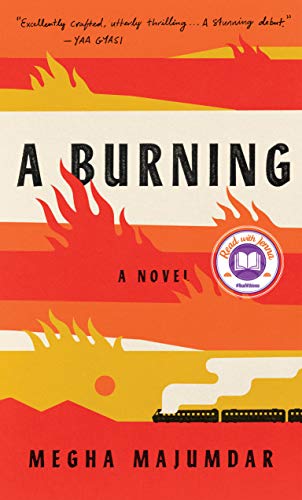A Burning
 A Burning, the debut novel by Megha Majumdar, received a very unusual stellar review by James Wood in the New Yorker:
A Burning, the debut novel by Megha Majumdar, received a very unusual stellar review by James Wood in the New Yorker:
Majumdar marshals a much smaller cast of speakers than Faulkner did, and her spare plot moves with arrowlike determination. It begins with a crime, continues with a false charge and imprisonment, and ends with a trial. The book has some of the elements of a thriller or a police procedural, but one shouldn’t mistake its extraordinary directness and openness to life with the formulaic accelerations of genre: Majumdar’s novel is compelling, yet its compulsions have to do with an immersive present rather than with a skidding sequence. Her characters start telling us about their lives, and those lives are suddenly palpable, vital, voiced. I can’t remember when I last read a novel that so quickly dismantled the ordinary skepticism that attends the reading of made-up stories. Early Naipaul comes to mind as a precursor, and perhaps Akhil Sharma’s stupendously vivid novel “Family Life.” Sharma has spoken of how he avoided using “sticky” words—words involving touch and taste and smell—so as to enable a natural velocity; Majumdar finds her own way of achieving the effect.
“A Burning” is about the fateful interactions of three principal characters, who take turns sharing their narratives. At its center is a young Muslim woman named Jivan, who lives in the slums of Kolkata, and who witnesses a terrorist incident that tips her life into turmoil. A halted train at a nearby station is firebombed, and the ensuing inferno kills more than a hundred people. At home, Jivan makes the mistake of posting a politically risky question on Facebook—“If the police didn’t help ordinary people like you and me, if the police watched them die, doesn’t that mean that the government is also a terrorist?”—which attracts official attention. The police come for her in the middle of the night.
…There are two people whose testimony could save Jivan, and much of the novel turns on their capacity and their willingness to offer it. One is an aspiring actress named Lovely, who also lives in the slum. Lovely—the name she took at eighteen—is a so-called hijra, a designation that affords intersex and transgender people a recognized status, but a perilously ambiguous and marginal one.
…The third protagonist, a physical-education teacher called PT Sir, knew Jivan when she was one of the “charity students” at S. D. Gosh Girls’ School.
I agree, A Burning is very good. I will add only two points. I wrote about the hijra of India when I was living in Mumbai and that post is well worth reading for background. Second, most of the reviews, especially the annoying NYTimes review by Parul Sehgal (compare Wood and Sehgal on Lovely’s voice, Wood is right and obviously so if you are not blinded by political correctness) focus on the Indian setting and contemporary Indian politics. That’s a natural, if superficial, vantage point. What impressed me more was the less obvious commentary on social media which is very relevant to the US. How does the pressure and potential of being seen by many others alter our choices? There are multiple mobs in A Burning; two of the mobs, one virtual, the other not, result in the brutal murders of innocent people, a third mob launches a star.